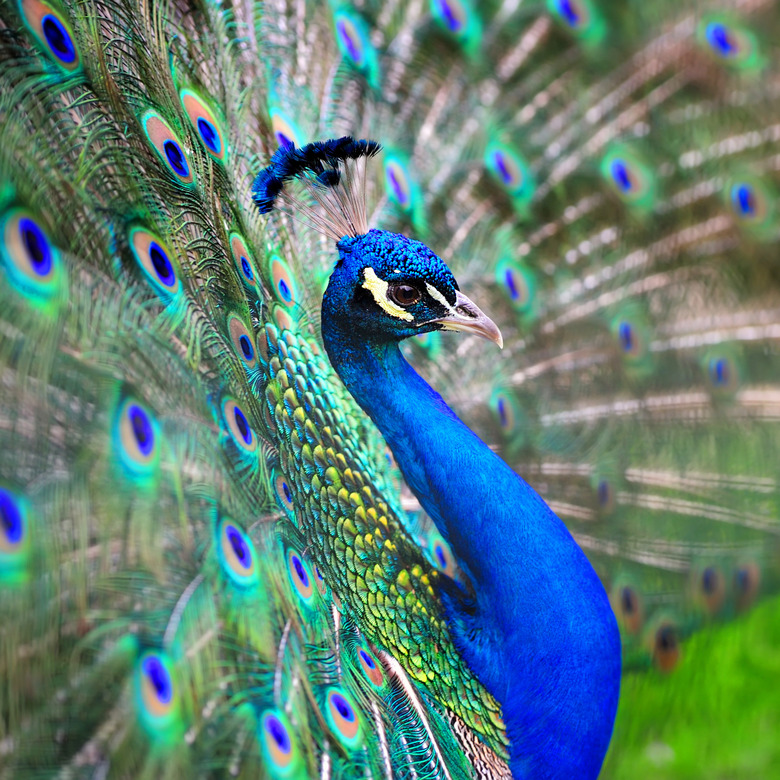What Are The Colors In A Peacock's Feathers?
The shimmering hues of a peacock's feather have been a source of aesthetic and scientific admiration for thousands of years. Unlike most birds, peacocks do not derive their colors purely from pigments, but from a combination of pigments and photonic crystals. This combination causes the feathers to reflect different wavelengths of light depending upon the angle of the light and the spacing of the crystals. The result is the iridescent shades of blue, green, brown and yellow commonly found in a peacock's train.
TL;DR (Too Long; Didn't Read)
Unlike most birds, peacocks do not derive their colors purely from pigments, but from a combination of pigments and photonic crystals. This combination causes the feathers to reflect different wavelengths of light depending upon the angle of the light and the spacing of the crystals. The result is the iridescent shades of blue, green, brown and yellow commonly found in a peacock's train.
Iridescent Blues
Iridescent Blues
The head and neck of the Indian, or blue, peacock is a rich, iridescent blue. This coloring is what distinguishes it from the green peacock, which has a green and copper coloring. Both species also possess an eye spot on their tail plumes with this same rich blue. This color is created by a crystalline lattice of nine to 12 rods containing melanin, a color pigment. These rods are spaced roughly 140 nanometers apart, a distance that causes light to reflect back at the viewer in wavelengths that fall in the blue spectrum.
Shades of Green
Shades of Green
Green is the dominant color on the head and neck of the three green peacock subspecies: the Java green, the Indo-Chinese green and the Burmese green. It also graces the tail plumes of both the blue and the green species. This color is created by a square lattice of roughly 10 rods spaced 150 nanometers apart. When light hits this structure, the wavelengths that are reflected back are in the green portion of the spectrum.
Copper and Brown
Copper and Brown
Varying shades of brown and copper are found on the bodies and tails of both of the peafowl species. There are also mutations of these species which are almost completely brown. The Buford bronze, for instance, has a tail which is chocolate brown with dark brown eye spots. These mutations are rare and are formed by selectively breeding peafowls so that their plumes contain mostly rectangular lattices of approximately four rods spaced from 150 to 185 nanometers apart.
Mellow Yellow
Mellow Yellow
A close examination of a peacock plume reveals a quill with many featherlike strands branching off of it. Each one of these strands is in turn made up of featherlike filaments called barbules. Although the color yellow is not always readily apparent on the peacock, it can appear on all or part an individual barbule and contributes to the overall color of the bird. It is formed by a crystal lattice composed of around six rods, each 165 nanometers apart.
Other Colors
Other Colors
Other colors, such as purple, are created by varying pigments and lattice patterns. The partial absence of pigments, a condition known as leucism, is responsible for peacocks that are partially or completely white. These peacocks are not distinct species, however, but rather mutations of the blue or green peacock.
Cite This Article
MLA
Arnold, Kylene. "What Are The Colors In A Peacock's Feathers?" sciencing.com, https://www.sciencing.com/colors-peacocks-feathers-8259752/. 16 April 2018.
APA
Arnold, Kylene. (2018, April 16). What Are The Colors In A Peacock's Feathers?. sciencing.com. Retrieved from https://www.sciencing.com/colors-peacocks-feathers-8259752/
Chicago
Arnold, Kylene. What Are The Colors In A Peacock's Feathers? last modified March 24, 2022. https://www.sciencing.com/colors-peacocks-feathers-8259752/
